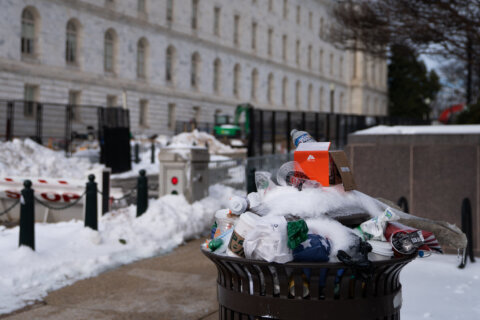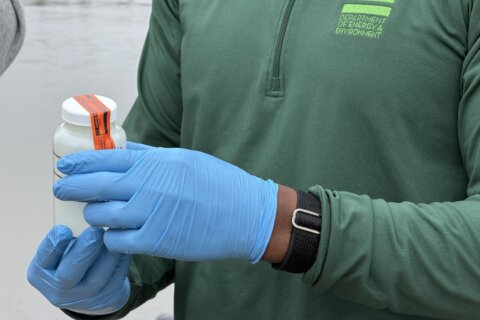For 16 years, D.C.’s Ward 3 council seat has been held by Democrat Mary Cheh. Earlier this year, Cheh ended her campaign for a fifth term, citing a “reevaluation” of her life amid the COVID-19 pandemic. Her departure from the race ahead of the primary prompted several candidates to jump into the race.
For the Democratic nomination, Matthew Frumin was selected by voters in the primary. Also hoping to take Cheh’s seat on the council are Republican David Krucoff and Libertarian Adrian Salsgiver. WTOP talked to all three candidates on the Nov. 8 ballot.
Meet the candidates
This video is no longer available.
Matthew Frumin, Democrat
Frumin is an attorney who was a political appointee at the U.S. State Department during the Clinton Administration, where he said he focused on democracy and human rights among other issues.
In Ward 3, Frumin has served as a chair for Advisory Neighborhood Commission 3E and has served on several community advisory boards, including serving on the board of the Lisner-Louise-Dickson-Hurt Home, an assisted living facility and nursing home for low-income residents in Northwest D.C.
“I’ve always thought if Mary Cheh didn’t run, then I would run, because I thought if I could get onto the council, I could make an even bigger difference than [what] I’ve been able to make over the last 15 years on lots of different issues,” Frumin said.
Frumin said among the issues he plans to tackle is overcrowding in schools and a need for more affordable housing. He also wants to focus on pedestrian and bicycle safety and public safety.
This video is no longer available.
David Krucoff, Republican
Krucoff has been a commercial real estate agent in the D.C. area and also owned a wholesale bakery in Ward 8. According to his campaign website, he is a member of the American Enterprise Institute Leadership Network, a policy education and professional development program for state-based executives in the public, private, and non-profit sectors.
“I’m looking to break through the unhealthy political monopoly in the District of Columbia, and to win as a non-Democrat in a ward for the first time ever,” Krucoff said.
Krucoff’s platform includes more investment in the city’s police department, lowering taxes and improving schools. Krucoff said he wants to get tough on the National Park Service about maintaining federal lands and to also get more workers to return downtown by pushing the federal government to order employees to return to the office.
This video is no longer available.
Adrian Salsgiver, Libertarian
Adrian Salsgiver is marijuana activist who has worked in politics since the 1980s, including campaigning for former Republican D.C. at-large council member Carol Schwartz, and most recently John Fanning, the D.C. Democratic State Committeeman for Ward 2. He said he is also a familiar face at Ward 3 Advisory Neighborhood Commission meetings.
“I really have my finger on the pulse of Ward 3,” Salsgiver said.
Salsgiver said he would work to “end all so-called COVID restrictions” in the city, and according to his campaign website, he called COVID vaccines a “bioweapon.” He’s in favor of making marijuana more accessible and is against bike lanes and police surveillance cameras in the ward.
Combating violent crime
While some of the crime trends are starting to decrease, all three candidates believe the city still has a lot to do to curb violent crime.
Frumin said more police officers are part of the solution, but also said a change is needed in the relationship police have with the communities they serve. He also called for the city to do more to attack the root causes of crime to prevent them.
“I don’t believe we will ever incarcerate our way to safety,” Frumin said.
Krucoff said a rise in crimes committed by young people comes from a failure to create consequences.
“I’m hopeful that I can be elected and I can try to have the council be more aware of human behavior and understand that we have to provide empathy and carrots, but we also have to provide sticks,” Krucoff said.
While Salsgiver believes “more deterrent and punishment” is part of stopping people from committing crimes, he also said he’d work to create more opportunities for young people.
Public housing
A recent audit of D.C.’s Public Housing Authority by the United States Department of Housing and Urban Development found “unsanitary” and “unsafe” conditions, among other serious issues at public housing units.
Krucoff claimed it is partly because of the city bringing in federal money that it cannot properly manage.
“We are still spending like drunken sailors,” he said.
Frumin said the city and the mayor should be embarrassed by the report, and that he would focus on better oversight for the city’s public housing authority.
“This is a thing that we all need to dig in really hard in the next council term: do serious oversight over DCHA, figure out how we can fix this issue — whether it’s governance, whether it’s investment, whether it’s some other kind of approach,” Frumin said.
Salsgiver believes allowing residents to own their units could help improve conditions and help low-income residents become homeowners.
“Give it to their kids and they could fix it up themselves, rather than just depending on a government to fix things for them,” Salsgiver said.
Migrant situation
In recent months, buses from Southern states including Arizona and Texas have been arriving in D.C., dropping off migrants from the Mexican border to the nation’s capital. In response, the city has established an Office of Migrant Services and many charities have stepped up to help those brought here.
“Sometimes, there are families and faith communities that are willing to take people in and help them get established,” Frumin said.
While claiming that Republican governors are using the migrants as “political footballs,” Frumin said he has met with “leaders of the sanctuary movement” in the region and believes the city should do more to support those faith-based community organizations that are helping the people being brought here.
Salsgiver said there isn’t much the council can do in this situation and said charities, not the city, should be the ones responding.
“That’s who needs to take care of the migrants, the homeless and so forth,” Salsgiver said.
Krucoff claimed being a so-called Sanctuary City has made D.C. a “magnet” for undocumented immigrants, and that the buses are a response to the Southern states “being swamped.”
“We have to take care of them by our laws, and we have to, but we have a message also to our members of Congress: that it’s not just about letting in everybody, but it’s also about enforcing the law, which means that you have a sovereign entity, the United States with a border. That’s the way nation-states work,” Krucoff said.
DC statehood
Frumin said he supports D.C. becoming a state and would use his position on the council to push for it, including public education on the issue for visitors as well as residents.
“There’s no national capitol anywhere else in the world where people don’t have a vote in their national legislature in the way that we do. We need to get statehood, we need to put our shoulders down to do it,” Frumin said.
Salsgiver only said that he believes the city should not have taxation without representation.
Krucoff said it is “disgusting” that D.C. residents do not have voting rights, but he has been a proponent of “retrocession” which would make most of D.C., minus the monuments and federal buildings, part of Maryland.
“I will work my damnedest to see that we have complete voting rights in my lifetime,” Krucoff said.
Marijuana laws
Last month, President Joe Biden, in addition to pardoning all those with simple marijuana possession convictions, ordered the U.S. Attorney General to look into potentially rescheduling the drug, which is now a Schedule 1 drug like heroin and LSD. If rescheduled, that could potentially lead to more debate and legislation regarding the use and sale of the drug in D.C.
As a longtime proponent of marijuana use, Salsgiver said he would push the city to not crack down on gift shops, at which free gifts of cannabis come with the purchase of other items.
“These places need to be legalized and regulated and not attacked and shut down,” Salsgiver said.
Salsgiver would like to see dispensaries opening in Ward 3.
Frumin said with the drug decriminalized, he hopes things will move toward a point where the drug can be safely sold in D.C.
“I would be looking for where the door opens so that we can do real regulation of that market and do it properly, and get to where marijuana is legal in our community, but also regulated and subjected to taxes,” Frumin said.
Krucoff, while not a fan of the pervasiveness of the drug in D.C. or gift shops, is open to the “less strict handling” of marijuana, because cracking down on its use would be “unwise.”
“I would like to work with my fellow councilpersons to manage the enhancement of marijuana in the District of Columbia,” Krucoff said.








